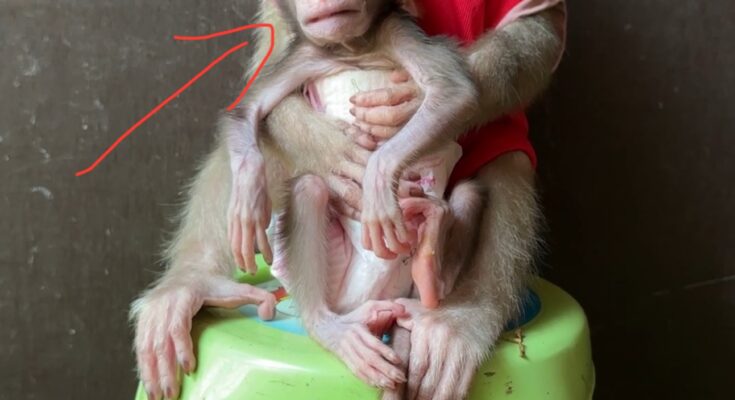In the heart of the tropical rainforest, deep within the dense canopy where sunlight trickles through green leaves, a gentle scene unfolds — one that speaks volumes about the bonds and social intelligence of primates. When the mother monkey ventures away, whether to search for food or find shelter, it’s often a bigger monkey — perhaps an older sibling, an aunt, or even a non-related adult — who steps in to care for the baby monkey.
This form of alloparenting, or caregiving by individuals other than the biological mother, is not uncommon in many primate species. In some monkey groups, these caregivers take on a vital role, ensuring the young are kept safe, warm, and comforted while their mothers attend to survival needs. The big monkey, often more experienced and calm, becomes a trusted guardian for the tiny infant.
Researchers have observed this behavior in several species, including rhesus macaques, vervet monkeys, and capuchins. The big monkey may cradle the baby in its arms, groom its fur gently, or carry it on its back, mimicking the actions of the mother. These moments of care help build strong social ties within the troop and ensure the baby grows up feeling secure and supported by more than just its mother.
Such assistance doesn’t just benefit the infant. It’s also a valuable learning opportunity for the big monkey. Juvenile females, in particular, often engage in babysitting behaviors as part of their development. By caring for younger monkeys, they gain critical experience in parenting — experience that will help them when they eventually raise their own young. This practice also enhances their standing within the troop, showing maturity and social responsibility.
From an evolutionary standpoint, shared caregiving can improve the survival rates of the young. If the mother faces danger or is delayed while foraging, having a trusted adult or adolescent step in can mean the difference between safety and vulnerability for the baby. This cooperation ensures the troop thrives as a whole, not just as individuals.
Moreover, emotional development plays a big role. Baby monkeys raised in nurturing environments, where multiple members show affection and care, often grow into more socially adept adults. They learn communication skills, emotional regulation, and the dynamics of trust and cooperation — all essential for life in a complex primate society.
The sight of a big monkey gently helping a baby is more than just heartwarming — it’s a reflection of how empathy, care, and responsibility exist in the animal kingdom. It reminds us that humans are not the only species that values family, community, and the safety of the young.
In the forest, where every day brings new challenges, this simple act of kindness — a big monkey helping take care of the baby monkey when the mother is away — is a powerful testament to the bonds that hold their world together.



